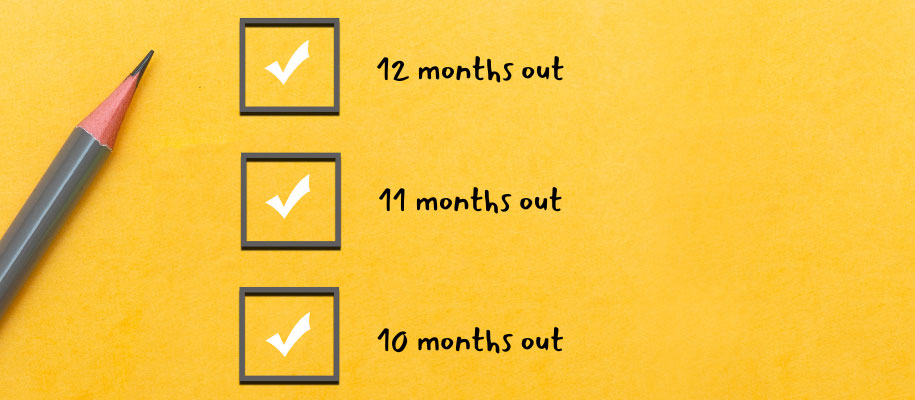The biggest mistake prospective students make by far is not doing adequate research and preparation before submitting their graduate school applications. Grad school isn't something to be taken lightly. It involves a major investment—personally, intellectually, socially, emotionally, and financially. Be sure to allow yourself enough time to do your due diligence and get all the information you want and need. This is the first part of a series on what to do in the 12 months leading up to submitting your graduate school application(s), broken down into three-month increments over four installments. Use this first installment to plan out 12–10 months ahead, and when you're done, visit the checklist for 9–7 months out to learn your next steps.
12 months before applying
- Do an initial online search for graduate programs in your intended field of study. Be sure to do several searches so you can find as many institutions matching your criteria as possible.
- Next, make an alphabetical list of all your options, regardless of what you presently know/have heard about them. Write them all down or put them on a spreadsheet. Remember: It’s where you end up, not where you start! Be careful about accepting word-of-mouth advice or what you think you know as final at this point. We’re all individuals with different needs, expectations, and experiences. This is your educational experience, not someone else’s. So don’t eliminate any of your options at this point. You want to get as much information as possible so you can decide what program is best for you.
- Do some research on all the institutions you have on your list. Assess not only the content of material on websites but the way it’s presented. Is information easy to find? Is the tone friendly and inviting? Are there easy and quick ways to request more information? Speaking of which, this is a good time to request written/electronic information from each institution. This will enable you to review what you receive anytime you want. It will also provide you an opportunity to find out just how responsive admission offices are to you. This can be very telling and may shed light on the general level of responsiveness of those institutions about which you have inquired. You can even grade them on this in your spreadsheet.
Related: 10 Overlooked Questions to Ask About Grad School
11 months before applying
- You should now start to narrow your search down a bit—but don’t narrow it too much. If you still have an interest in a college or university despite a bad first impression, keep it on the list for now. However, if you continue to get the same treatment (unresponsive, hard-to-navigate website, etc.) you did when first browsing for information, ask yourself: If I’m being treated this way now, how will it be if I apply, get accepted, and enroll?
- Expand the spreadsheet you created last month to compare each of the options that remain on your list. I suggest putting your options down the left-hand column in alphabetical order, with schools or programs you wish to compare going across the top row. Here are some suggestions on what information to add:
1. Program formats (on campus, online, hybrid)
2. Location/distance from home
3. Friendliness of admission staff
4. Interaction with current students
5. Interaction with faculty
6. Interaction with alumni
7. Perception from campus visits or admission event(s) you attend
8. Number of students enrolled in the entire institution
9. Number of students enrolled in the program you're considering
10. Student-faculty ratio
11. Average class size
12. Grading system
13. Facilities
14. Housing options (should you be relocating)
15. Extracurricular opportunities
16. Career services/employment percentages
17. Tuition and total costs for one year
18. Financial aid (including scholarships, loans, assistantships, fellowships, and work-study)
19. Application deadlines
20. Application fees
21. Application requirements (including any standardized test[s] needed)
22. Helpfulness of website and brochures
23. Is an interview required?
24. Do they keep a waiting list of applicants?
25. Can you appeal/get feedback if denied?
Some of the columns in your research spreadsheet might have letter grades; some will say “yes,” “no,” or “maybe”; some will be dates, dollar amounts, or various numerical responses; and some will be more evaluative (on a scale of 1–5, with 1 being terrible and 5 being outstanding).
10 months before applying
- Work on completing your research spreadsheet, filling in every column for each option. As you go along, you’ll eliminate some or many options. That’s okay! You’re doing what you should be doing: comparison shopping.
- Do a very general ranking of the options that remain. You could rank every option, starting with #1 and going to the end of the list. Or you could group your options: top group, second group, third group, etc. Ideally, you should have at least five options left. However, depending on the type of graduate program you seek, the number of options will vary. The point is that you’re still not at the place where you need to have a “short list.” You’re still 10 months away from applying, and you’ll have several opportunities to narrow down your list before that time.
Related: How to Find a Graduate Program That Fits You
The grad school admission process is no joke. There are a lot of moving parts, a lot of research to do, a lot of requirements, and a fair amount of stress involved. But if you keep yourself organized and on top of the process by breaking it down into these easy-to-follow monthly tasks, it will be a lot easier and more effective in the long run.
Ready for your next steps? Keep your grad school application plans moving forward with the 9–7-month installment of our 12-month checklist, and learn more about the author at GradSchoolRoadMap.com.






